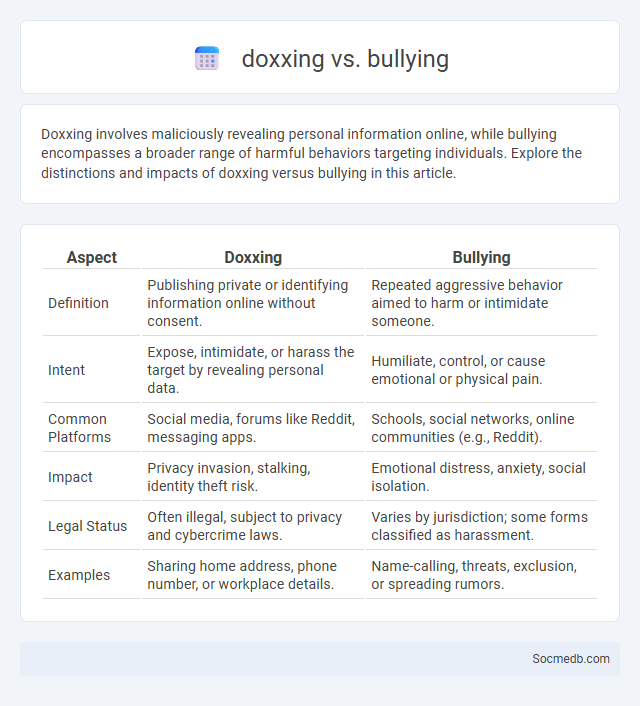
Photo illustration: doxxing vs bullying
Doxxing involves maliciously revealing personal information online, while bullying encompasses a broader range of harmful behaviors targeting individuals. Explore the distinctions and impacts of doxxing versus bullying in this article.
Table of Comparison
| Aspect | Doxxing | Bullying |
|---|---|---|
| Definition | Publishing private or identifying information online without consent. | Repeated aggressive behavior aimed to harm or intimidate someone. |
| Intent | Expose, intimidate, or harass the target by revealing personal data. | Humiliate, control, or cause emotional or physical pain. |
| Common Platforms | Social media, forums like Reddit, messaging apps. | Schools, social networks, online communities (e.g., Reddit). |
| Impact | Privacy invasion, stalking, identity theft risk. | Emotional distress, anxiety, social isolation. |
| Legal Status | Often illegal, subject to privacy and cybercrime laws. | Varies by jurisdiction; some forms classified as harassment. |
| Examples | Sharing home address, phone number, or workplace details. | Name-calling, threats, exclusion, or spreading rumors. |
Understanding Doxxing: Definition and Scope
Doxxing involves the malicious act of publicly revealing someone's private information, such as home address, phone number, or workplace, without their consent on social media platforms. This violation of privacy can lead to harassment, identity theft, and significant emotional distress. Understanding doxxing's definition and scope empowers you to recognize and protect against these digital threats.
What is Online Bullying? Key Characteristics
Online bullying involves the use of digital platforms such as social media, messaging apps, and websites to harass, threaten, or humiliate individuals. Key characteristics include repeated aggressive behavior, anonymity of the bully, and the potential for a wide audience exposure. Protecting Your online presence requires understanding these traits to recognize and address harmful interactions effectively.
Personal Information Doxxing Explained
Personal information doxxing involves the unauthorized release of private details such as home addresses, phone numbers, or financial information on social media platforms. This practice exposes individuals to risks like identity theft, harassment, or stalking by malicious actors exploiting visible user-generated content. Protecting sensitive data through strict privacy settings and cautious sharing habits is essential to mitigate the threat of doxxing in online communities.
Main Differences: Doxxing vs. Online Bullying
Doxxing involves publicly sharing private or identifying information about an individual without consent, often with harmful intent, while online bullying encompasses repeated aggressive behaviors such as harassment, threats, and humiliation across social media platforms. Doxxing targets personal privacy and can lead to real-world consequences, whereas online bullying primarily aims to intimidate or emotionally distress the victim. Both pose significant risks to mental health and online safety but differ in their methods and scope of impact.
Overlapping Risks: Where Doxxing and Bullying Intersect
Doxxing and bullying often overlap on social media platforms, creating compounded risks that threaten Your privacy and safety. When personal information is maliciously shared online, it can escalate harassment and lead to severe emotional distress or real-world harm. Understanding these intertwined dangers is critical for implementing effective protective measures and maintaining control over Your digital presence.
Legal Perspectives: Laws on Doxxing and Bullying
Laws on doxxing and bullying vary by jurisdiction but increasingly focus on protecting individuals from online harassment and privacy violations. You should be aware that doxxing--publishing private information without consent--can lead to civil and criminal penalties under cyber harassment and privacy statutes. Understanding these legal frameworks helps ensure that your social media activities respect the rights and safety of others while avoiding potential legal consequences.
Consequences of Doxxing: Personal and Social Impacts
Doxxing exposes Your private information online, leading to severe personal consequences such as harassment, identity theft, and emotional distress. Socially, it undermines trust within communities and can fuel cyberbullying, perpetuating a hostile digital environment. The widespread effects of doxxing highlight the urgent need for stronger online privacy protections and awareness.
Protecting Yourself: Preventing Bullying and Doxxing
Protecting Yourself on social media requires vigilant privacy settings to prevent bullying and doxxing. Use strong passwords, limit personal information shared publicly, and report any abusive behavior immediately to platform moderators. Your proactive measures can significantly reduce the risks associated with online harassment and identity exposure.
Reporting Abuse: Steps for Victims of Doxxing and Bullying
Victims of doxxing and bullying on social media should first document all evidence, including screenshots and URLs, to support their report. They must utilize platform-specific reporting tools to submit a detailed complaint against the abuser while adjusting privacy settings to limit further exposure. Seeking support from legal authorities or specialized online harassment organizations ensures protection and potential legal action.
Building Safe Digital Spaces: Community Responsibilities
Building safe digital spaces requires collective community responsibilities, including vigilant content moderation, respectful communication, and proactive reporting of harmful behavior. Your role involves fostering inclusivity and supporting platforms that implement robust security measures and privacy protections. Empowered users contribute to a trustworthy online environment where everyone feels safe to engage and express themselves.
 socmedb.com
socmedb.com